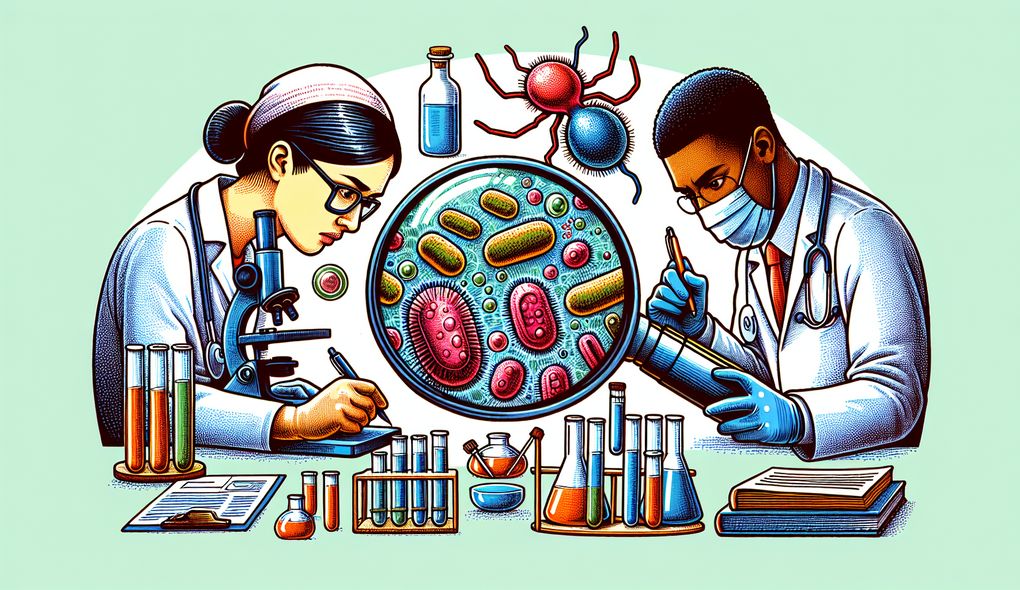What role do research and analysis play in your approach to treating infectious diseases?
INTERMEDIATE LEVEL

Sample answer to the question:
Research and analysis play a significant role in my approach to treating infectious diseases. When faced with a new patient, I start by conducting a thorough analysis of their symptoms and medical history. This helps me identify potential causes and narrow down the possibilities. I then turn to relevant research studies and medical literature to gather insights and evidence-based treatment options. By staying up-to-date with the latest advancements in the field, I can provide the most effective and tailored treatment plans for my patients. Additionally, research and analysis also enable me to contribute to the development of new treatment methodologies and enhance our understanding of infectious diseases.
Here is a more solid answer:
Research and analysis are integral components of my approach to treating infectious diseases. When encountering a new patient, I meticulously examine their medical history, conduct a comprehensive physical examination, and order relevant diagnostic tests. These initial steps allow me to gather essential data and establish a solid foundation for my research. Subsequently, I delve into medical literature, scientific journals, and research studies to gain the latest insights into infectious diseases and explore evidence-based treatment options. By staying informed about emerging pathogens and advances in treatment protocols, I can create tailored and effective treatment plans for each patient. Furthermore, my research efforts extend beyond individual cases. I actively contribute to ongoing research projects and collaborate with fellow experts in the field to enhance our collective understanding of infectious diseases and improve treatment methodologies.
Why is this a more solid answer?
The solid answer not only emphasizes the candidate's proficiency in research and analysis but also highlights their clinical and diagnostic skills, which are crucial for an infectious disease specialist. The answer provides specific examples of how the candidate uses research and analysis in their daily work and also mentions their contribution to larger research efforts. However, it can still be improved by including more details on the candidate's collaboration with multidisciplinary teams and their communication skills in disseminating research findings.
An example of a exceptional answer:
Research and analysis form the bedrock of my approach to treating infectious diseases. As an infectious disease specialist, I have honed my clinical and diagnostic skills to swiftly identify potential infections and devise efficient treatment plans. When faced with a new patient, I thoroughly evaluate their medical history, meticulously examine their symptoms, and order a comprehensive array of diagnostic tests. Armed with this data, I embark on an extensive research process that involves delving into peer-reviewed publications, attending medical conferences, and collaborating with esteemed colleagues. By staying at the forefront of medical research, I am equipped with the latest knowledge on emerging pathogens, treatment modalities, and infection control. This enables me to provide comprehensive and targeted care to my patients. Additionally, my strong research acumen allows me to contribute to novel research projects that aim to enhance our understanding of infectious diseases and develop innovative treatments. In multidisciplinary teams, I adeptly communicate research findings and collaborate with colleagues, ensuring that our collective efforts are aligned and beneficial for our patients.
Why is this an exceptional answer?
The exceptional answer demonstrates the candidate's deep expertise in infectious diseases and their commitment to ongoing learning and professional development. It showcases a high level of proficiency in clinical and diagnostic skills and highlights the candidate's extensive research efforts that go beyond individual cases. The answer also emphasizes the candidate's ability to effectively communicate and collaborate with multidisciplinary teams. However, to further enhance the answer, more specific examples of research projects and collaborations can be provided.
How to prepare for this question:
- Familiarize yourself with the latest research studies, scientific journals, and medical literature on infectious diseases. Stay informed about emerging pathogens, treatment modalities, and infection control strategies.
- Highlight your experience and proficiency in clinical and diagnostic skills during the interview. Discuss specific cases where research and analysis played a crucial role in your treatment approach.
- Demonstrate your ability to collaborate effectively with other healthcare professionals by sharing examples of multidisciplinary teamwork in managing infectious diseases.
- Develop strong communication skills to effectively disseminate research findings and educate patients, families, and the community on infectious disease prevention and control.
- Stay committed to ongoing medical education and professional development by attending conferences, workshops, and continuing medical education programs related to infectious diseases.
What are interviewers evaluating with this question?
- Knowledge of infectious diseases
- Clinical and diagnostic skills
- Communication and interpersonal skills
- Ability to work in a multidisciplinary team
- Research and analytical skills

